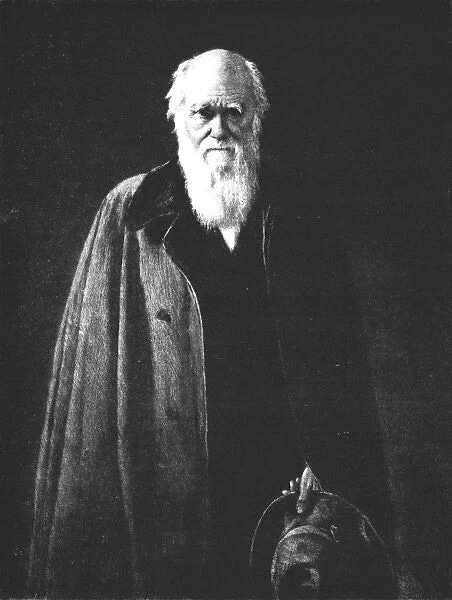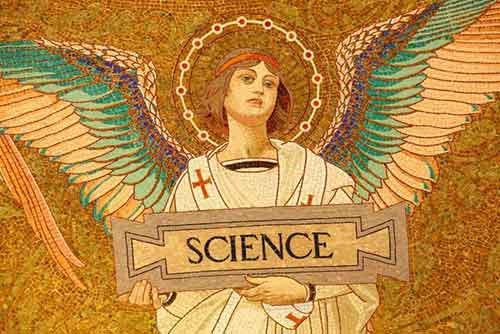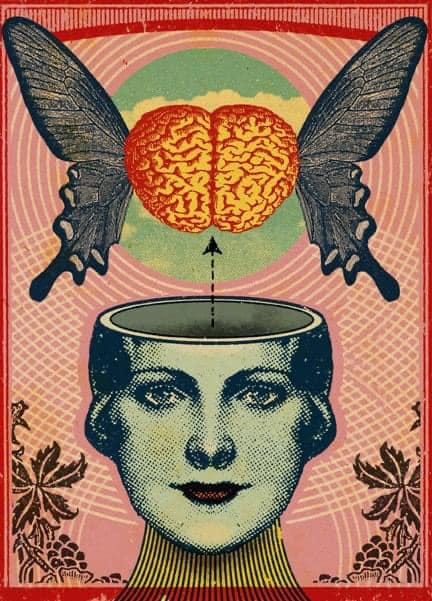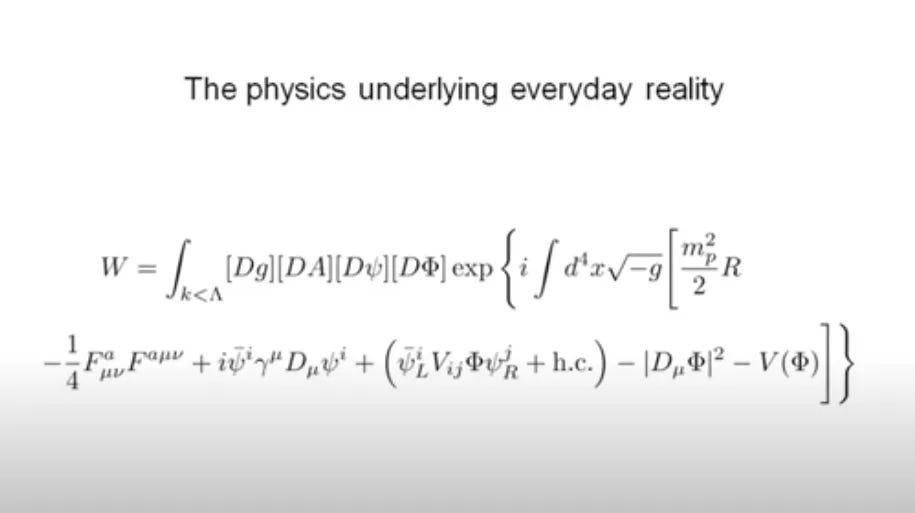Why Science Cannot be a Substitute for God (or can it?)
The Case for Unifying Science and Religion (Part Four)
The above photo is Cassandra Extavour, a trailblazing Canadian geneticist, researcher of evolutionary biology, and professor of molecular and cell biology. She was the first Black woman to be tenured in the biological sciences at Harvard. In 2021 she became a Howard Hughes Medical Institute Investigator, and was named the Timken Professor of Organismic and Evolutionary Biology and of Molecular and Cellular Biology at Harvard.
Cassandra Extavour is a remarkably unique human being. She has roots in Trinidad, grew up in Canada, and worked three jobs, including McDonald’s, to pay for her undergraduate degree at the University of Toronto. She attended graduate school in Spain where she became the first woman in the research lab, overcoming racism and sexism to pursue her interests in science. After graduating with a PhD in Genetics, she moved to Greece for her post-doctorate training, took a professorship at Harvard, and continues to publish research and has become a leader in the field of evolutionary genetics.
Cassandra was the first Black, queer woman throughout her educational journey. She is a distinguished Harvard professor in evolutionary biology, and yet she is also a classically trained soprano who performs with the Boston Landmarks Orchestra and the Handel and Haydn Society. Oh yeah, and she’s quite the pastry chef.
I mention Cassandra Extavour because she seems to break the mold of how people typically think of evolutionary scientists. Despite my admiration for both Charles Darwin and Richard Dawkins, you’d think from the prominence of their pictures that the field of evolutionary biology is mostly angry white Western men. But it’s not true. Some of them are black, queer, Trinidadian women.



My reason for bringing this up is because I’m wanting in this article to cast Darwinian evolution in a new light that perhaps you’ve never considered before, particularly if you’re someone who has been influenced by religion. I’m hoping this piece helps break the mold of conventional thinking about the meaning of evolution. Just putting the words “meaning” and “evolution” together might be unfamiliar to some people who don’t equate evolutionary biology with matters of existential import.
Let me quickly dispel the most extreme religious misinformation about evolution:
Charles Darwin is not a Satanist who aimed to corrupt the hearts and minds of innocent children with an evil theory about the origins of life.
The theory of evolution was not the result of a team of evolutionary biologists who met at Cambridge University in the 1850’s, hell-bent on concocting any explanation of the universe that finally killed off God.
The implications of Darwinian evolution is not a random, indifferent and meaningless existence, consisting of nothing more than particles, chemicals and mechanistic processes, forcing us toward the heat death of the universe.
The evolution of our species Homo sapiens does not mean that we are nothing more than apes who became a little smarter than digging up termites for food or being caged in zoos. (Although watching all the Planet of the Apes films got me wondering.)
Maybe I had a little too much fun with that, but I think you get the point. Evolution is not the antithesis of God, despite Friedrich Nietzsche’s declaration that “God is dead”, induced by Darwin’s findings published in On the Origin of Species. I don’t disagree with Nietzsche, I just think his definition of “God” (Christian theism) doesn’t account for other legitimate views of “God” or makes room for transcendence in the natural sciences.
The question I want to discuss in this piece is:
Does the search for knowledge and truth in science lead to God, and does the search for knowledge and truth in religion lead to science, and when they meet, then what?
The nature of this question might imply something that I don’t mean, which I want to quickly address.
German theoretical physicist Werner Heisenberg was a 1932 Nobel laureate and father of quantum mechanics. Heisenberg was a devout Christian who wrote in his last letter to Albert Einstein, “We can console ourselves that the good Lord God would know the position of the subatomic particles, thus He would let the causality principle continue to have validity.”
An often quoted statement by Werner Heisenberg is, “The first gulp from the glass of natural sciences will turn you into an atheist, but at the bottom of the glass God is waiting for you.” My question of whether the search for knowledge and truth in science leads to God, is not meant to imply there is scientific evidence that justifies the belief in “God” as conceived by Christian theism - a supreme supernatural being who created the universe, oversees its affairs, and is guiding history toward the fulfillment of a divine plan. In my view, despite the various arguments aimed to prove otherwise, one will not find that “God” at the bottom of the glass of natural sciences. Keep in mind that neither do I believe that Jesus espoused the view of that God.
That the universe evolved with a design process, which the word “intelligence” could be used to describe, doesn’t require there must be an intelligent designer, which is God. Of course a junk-yard tornado can’t produce a Boeing 747, but equating Darwin’s theory of evolution with a junk-yard tornado is not understanding evolution.
As a spoiler alert, I will answer my stated question directly and then share some of my thinking behind it.
Yes, I do believe that the search for knowledge and truth in science leads to God, and the search for knowledge and truth in religion leads to science. Or to put it more descriptively:
The search for knowledge and truth in science speaks to existential realities that “God” has traditionally monopolized.
The search for knowledge and truth in religion inevitability reimagines “God” in ways that are synonymous with science.
How Science Leads to God
As a reminder, this is the fourth part of my Substack series, “The Case for Unifying Science and Religion”. My aim in this series is to make a case for science and religion to be allies. The installment of this series so far are:
Part One: WWSD? What Would (Carl) Sagan Do? I have chosen Carl Sagan as the patron saint for reconciling and unifying science and religion.
Part Two: Can you believe in Darwin and Jesus? There’s no good reason to pit science and religion against each other.
Part Three: Did Science Discover the Immortal Gene? Why science must understand religion better, and religion understand science better.
Part of the misinformation of Darwinian evolution is that it is void of all meaning and purpose, and you couldn’t find any spirituality or transcendent significance in it, even if the Dalai Lama and the Pope teamed up and gave it his best shot.
Though Charles Darwin is most credited with having originated the theory of evolution by natural selection, our understanding of the theory has been refined and expanded since 1859. In other words, there has been an evolution of evolutionary theory. A couple significant post-Darwinian advancements of the theory of evolution have taken place through genomics (the specialty of Cassandra Extavour), the modern synthesis and universal Darwinism.
But there has been another kind of post-Darwinian refinement of evolutionary theory that I have been particularly noticing, which I will call “evolutionary existentialism”. Here’s how I define it:
Evolutionary existentialism is information about the meaning of existence that can be inferred through the natural processes of evolution.
In other words, Darwinian evolution offers credible answers to life’s greatest existential questions, such as:
Where did we come from?
What is the meaning of life?
What is the essence of existence?
What is our greater purpose?
How should we live our lives?
What happens when we die?
It would be impossible for me to achieve due justice in a discussion about Darwinian evolution and existentialism. My mindset with this Substack publication is hoping to challenge people to process the lived human experience more deeply, which I believe involves acquiring and employing new knowledge. Turns out that this learning process has always been the algorithm behind evolution and natural selection, which is responsible for actualizing our fullest possibilities and potentialities.
Straight away this should prime the pump in understanding Darwinian evolution much differently. Rather than chance, random, mechanistic and unforgiving biological warfare in the struggle to survive, it’s a learning algorithm that is a property of the universe at every level, catalyzing the process of becoming, which has produced the likes of human consciousness, language and culture.
If all you did for the rest of your life was cooperate with the natural and universal algorithm of natural selection, you’d be set. Here’s one small example of it:
The world is filled with chaos, disorder and entropy, which appears in the context of your life in many ways.
Within that context there are countless people of different types, all vying for well-being in some way.
It’s not possible for all those people in competition to achieve well-being in the way they are seeking it through materialism, wealth, success, and comfort.
This knowledge of your environment about how the struggle for well-being is failing becomes the necessary information for making an adaptation.
The adaptation made is identifying a different means for seeking well-being for which their is an unlimited resource that is never threatened, which are those psychological and spiritual resources that can be cultivated within oneself.
This new variation for achieving well-being is shared and reproduced with others through personal relationships, parenting, and other means of societal influence.
That six-step process is how evolution produced all species of the earth, and the high-level advancement of our species. The natural selection learning process involves:
Entropy → Pressure to survive → Information received from environment → Adaptation Adjustment → New Emergent Reality of Life → Variation Reproduced
It is not necessary to have a Bible or believe in God to discover this. It’s true that prior to modern science, the birth of religious imagination was an adaptation we made to alleviate the existential pressure of human survival. It was not all that inventive that we essentially came up with a “God” that was a perfected version of ourselves, but it worked… until it didn’t.
Friedrich Nietzsche’s declaration that “God is dead” was not meant to strip the universe of all meaning and transcendence. It was simply a proclamation for the need to adapt. In other words, the next step on the ladder of cultural evolution is to use Darwinian evolution as information to construct a more advanced meaning-maker framework that no longer holds to the idea of a Gandalf sky-God who rules the universe and condemns people to eternal conscious torment if they don’t fly right.
That doesn’t mean that the Bible and “God” are useless and headed for extinction. It means we must approach these ideas and artifacts differently. We have proven we can do this. Right? We once thought the world was flat. We once thought demons caused physical disease or that deadly weather systems were God’s punishment. We once thought that appeasing the gods would bring rain and a harvest.
The amazing thing is not only that the above evolutionary learning algorithm is a property of the universe that has been advancing life for billions of years, but that a step in this process has been the development of a species that figured this out in order to produce realities of beauty and transcendence.
Bobby Azarian writes in The Romance of Reality:
“The overarching thesis is that we live in a computational universe that is continuously evolving into an increasingly complex, functional, and sentient state. This means that humans are neither a cosmic accident nor the end goal of evolution. Instead, we are an intermediary step on the evolutionary ladder of becoming.”
Unfortunately, too often religion has taught that faith and proper theology should be guiding our path forward. This kind of thinking often leaves people with significant human development deficits, which includes a poverty of knowledge. One reason why some religious people never advance past archaic, harmful and self-sabotaging beliefs, mindsets and behaviors is because their religious conditioning cut them off from fields of knowledge such as the sciences and psychology, which provide necessary information to thrive.
Think of this article as a primer. If you want to do a deep dive into the subject of “evolutionary existentialism”, I would recommend reading the following books:
On the Origin of Species by Charles Darwin
The Descent of Man by Charles Darwin
Darwin’s Dangerous Idea by Daniel Dennett
A Universal Learning Process (The Evolution of Meaning) by
Universal Darwinism by John Campbell
The Knowing Universe by John Campbell
I Am A Strange Loop by Douglas Hofstadter
The Concept of Nature by Alfred Whitehead
A word about this reading list. I’ve read all of them. It’s a long list. I get that it’s not realistic to read all these books. The first two books are obviously useful for understanding the theory of evolution from Darwin himself. It seems we owe it to Darwin to hear him out in his own words. The next three books (Dennett, Azarian, Dempsey) are very readable books for exploring the landscape of the existential dimensions of Darwinian evolution. The two books by Campbell dive more deeply (and perhaps technically) into Darwinian metaphysics. I’ll be honest, that last book by Hofstadter is a difficult read, but it’s unique in presenting an evolutionary explanation for consciousness. I couldn’t resist Whitehead’s book, which is an excellent read and important contribution to the development of philosophic naturalism.
The list isn’t necessarily the be-all best list of books written on evolution, but they were useful books for me in exploring the intersection of Darwinian evolution and existentialism.
Campbell points out in the Introduction of his book Universal Darwinism that Albert Einstein viewed religion as an evolutionary process and predicted that its next stage would be a “cosmic religious experience” made available through an understanding of science. Einstein even went so far as to say that the purpose of science is to make this cosmic religious experience available to anyone receptive to it.
But if this is true, why aren’t people handing our Einsteinian pamphlets about scientific spirituality on every street corner? One answer is simply that science is hard. A person would have to devote themselves wholeheartedly and undertake a huge effort of study in order to understand even a small subset of science. It was a significant investment of time and energy for me to read the above books, but I am a different person for having read them.
In most conventional religions all that is required is faith, but science requires a commitment to understand reality on the basis of evidence. In my view, one of the most significant developments in evolutionary theory is the discovery of its existential relevance, which could make Einstein’s vision for an accessible cosmic religious experience, a reality. But getting there is going to require some work.
People are fond of the Dr. Seuss quote, “Sometimes the questions are complicated and the answers are simple.” The implication is that the tell-tale sign of the deepest truths is simplicity, and conversely, the proof that a claim of universal truth must be wrong is its complicated. Back in the day, believing the earth was the center of the universe was a simple ask and religion backed it. Galileo’s Copernican heliocentrism was much more complicated to the thinking person of that day, but it was true. We live in a time when understanding the existential relevance of Darwinian evolution is relatively new and feels complicated. However, this is changing. I hope this series of articles will contribute to this understanding in a tiny way.
It’s okay for both the questions and the answers to be complicated, at least for a time. The most liberating truths may not always be served on a silver platter, but require determination and grit, the kind that Cassandra Extavour has exhibited. George Bernard Shaw wrote, “All great truths begin as blasphemies.” Darwin’s heresy is that the meaning of life is found looking into the universe, not the God of religion that stands outside it. It’s a volatile transition as Friedrich Nietzsche warned. Remembering Thomas Paine’s words, ours may again be “the times that try men’s souls.” One of the reasons I am writing this series is seeking for science and religion to bury their animosities and embrace one another as allies.
Connecting Evolution and Meaning
Is Biology Enough?
A significant aspect of connecting evolution with matters of ultimate significance such as the meaning and purpose of life, is language. Science has a technical language - language that is specific to scientific inquiry. The primary fields related to matters of ultimate significance - religion, spirituality and philosophy also have a technical language - language that is specific to existential inquiry. As a reminder, most fields of knowledge have a technical language or language that is unique to a particular field of endeavor - technology, architecture, law, medicine, music, etc. No specialized language is superior, all specialized language is purposeful.
Generally speaking, science avoids existential language with a ten-foot pole, fearing that science will be tainted by ideas of God, religion, spirituality and the supernatural. Non-religious spirituality also steers away from this language. For example, the American Humanist Association defines humanism (bold added) as:
“Humanism is a progressive philosophy of life informed by science that, without theism or other supernatural beliefs, affirms our ability and responsibility to lead ethical lives of personal fulfillment that aspire to the greater good.”
I get it.
However, Homo sapiens require more than the knowledge and language of particles, neurons and quarks to survive and thrive. Science doesn’t want to acknowledge that the religious imagination was born as a necessary adaptation to the existential pressures of early human existence, as pointed out in my series The Evolution of Religion. Even if you declare “God is dead” and became a completely secular society, our species cannot survive and thrive merely with the knowledge and language of particles, neurons and quarks. It might be helpful to remember that our species survived and thrived for millions of years without this knowledge, and developed language primarily to establish symbols of meaning to bolster the necessary existential health and psychological immune system to keep the project of human survival going.
We still have a bit of a hangover from the dominant scientific ideology of the nineteenth and twentieth centuries, known as reductionism, which essentially asserts that all existence can be explained and understood through molecular biology. This reductionist approach to science helped popularize the philosophical stance known as materialism, which holds that reality only consists of that which is physical. The prevailing view of science has been “scientific naturalism”, which states that nothing exists beyond the natural world and that scientific forms of investigation are the only way to gain knowledge of the cosmos. While this helped the cause of further ridding science of supernatural concepts like souls and spirits, it virtually stripped existence of any possibility for teleological significance or transcendent meaning in the fundamental architecture of the world.
Not to minimize the contribution of the natural sciences and physics, the below explanation of the universe doesn’t exactly inspire a life of beauty, transcendence and meaning:
No person, including evolutionary biologists and quantum physicists, consciously engage and process life on the level of particles, neurons and quarks. The dynamics and complexities of the lived human experience cannot be reduced to biology and physics. One of the most significant developments of Darwinian evolution for Homo sapiens is how evolution has fueled higher levels of complexity, including the development of consciousness, language and cultural evolution.
You don’t need to understand the composition and bonding process of your home’s concrete foundation in order to successfully live in it. Yes of course, the foundation is what makes the house possible, but you need a lot more knowledge to occupy a home than calcium silicates, aluminates and ferrites and how they react with water. Likewise, molecular biology and quantum physics are foundational to the structure of reality, but this knowledge alone is not adequate to survive and thrive as human beings in the world. So what did we do? We evolved, we made adaptations, we acquired a new set of tools.
In my view, the rejection of religion by science is a rejection of Darwinian evolution. That doesn’t mean that religion is a required adaptation of human survival for all people. However, the foundational needs and desires that give birth to religion, are necessary. Rather than attacking fundamentalist or extremist religion (which any reasonable person would agree), I wish more evolutionary biologists would study fields such as the philosophy of religion and the anthropology of religion.
25 Meaningful Post-Religion Lessons From Evolution
In articles such as this, I have to keep in mind what my place is. I am not a professional evolutionary biologist, cognitive scientist or quantum physicist. I probably know more than most people in these areas only because I am an avid self-learner and have poured countless hours into studying these subjects. There are three things one needs to become competent in any area of knowledge: time, effort and the right sources.
In terms of the teleological and existential implications of Darwinian evolution, the reading list I mentioned above will be useful. My background is in theology, philosophy and philosophy of religion. I also do a lot of work in the areas of religious deconstruction, religious trauma healing and recovery, cultivating an authentic and liberating non-religious spirituality, and building stronger existential health.
I thought it might be useful in this article to share how understanding Darwinian evolution more deeply offers the raw materials for cultivating a meaningful non-religious spirituality. What follows are 25 meaningful post-religion lessons from evolution.
One of Darwin’s most fundamental contributions is showing us a new way to make sense of “why” questions: Why am I alive? Why am I here? Why is anything what it is? Why do I have sentience?
Darwin offers a credible explanation for the existence of human beings not by divine creation but by descent with modification.
A Darwinian explanation of the existence of everything is that life on earth has been generated over billions of years in a single branching tree - the Tree of Life - by one algorithmic process or another.
The variation on which the process of natural selection depended was unplanned, but the process itself has a purpose.
Nature creates a design space, which is more complex, sophisticated, brilliant and breathtaking than anything we could come up with.
The first brains were trivial feedback loops but when evolutionary pressures made brains more complex and multi-layered, the repertoire of categories to triage their environment eventually became capable of pointing back to itself and discovering a self.
Living beings have been shaped by evolution to have survival as their most fundamental, automatic, and built-in goal, but in the process we acquired emergent properties that have catalyzed interest in higher levels of being and becoming.
The difference between Homo sapience and all other species is what has evolved in our interiority, especially our acquisition of “I-ness.”
There is an inherent learning process that is a property of the universe at every level, which catalyzes the evolutionary process into new emergent planes of existence, which so far has advanced matter to life to mind to culture.
How we interact with our environment is a source of great meaning because integrating information in an adaptive way has the causal power to enhance the process of becoming and thriving.
The evolutionary outcome of consciousness in our species is that meaning becomes experiential, whereby meaning is not simply something that is mechanistically useful, but is felt deeply on a mental or psychological level.
The evolved neurocognitive architecture of the human mind produced language, which allows meaning within the mind of the individual to be exchanged with others and used to cultivate culture.
Energy organizes matter into life, life organizes information into knowledge, knowledge makes the universe intelligible or as Carl Sagan put it, “We are a way for the cosmos to know itself.”
We live in a computational universe that is continuously evolving into an increasingly complex, functional, sentient and intelligent state.
The universe has a self-organizing algorithm, arising from the laws of nature and the collective interactions of the systems components, which includes a positive feedback loop for learning and adaptation.
Life’s purpose could be conceived as inquiring knowledge that preserves and expands the order constructed by life.
Nature has an intrinsic purpose to wake up and experience the fruits of its own creation.
Every current model of the world has errors and it gives instructions for how to self-update with new information and evidence, and this self-correcting component makes the universe self-aware.
Every living thing constructs a model of its environment for the purpose of survival through natural selection, and when the mind added itself into that model, consciousness was born.
All biological life works together as a self-regulating system that is altering the planet for its own benefit, and new emergent properties such as agency and mind further propagate life in the universe.
What we now know about the universe makes the idea of a “heat death” or “big freeze” more unlikely, and a never-ending cosmic evolution probable.
A goal-directed universe that grows increasingly intelligent and self-aware implies that existence is meaningful and purposeful.
The possibility of awareness beyond self-awareness (meta-awareness) - awareness of self-awareness, or possibly awareness of awareness of awareness could take humanity to new heights and the birth of a global brain.
The human knower in relation to the known is where infinite possibilities and potentialities arise.
The law of evolution is that the strongest survives, and we have learned that there is no strength to be gained from hurting one another.
There are countless lessons from Darwinian evolution that are meaningful; the above 25 are just a few.
If you’re interested, the below video is an overview of the “Tree of Knowledge” theory derived from Darwinian evolution.
If you have some time on your hands, this discussion about a “Unified Theory of Knowledge” is interesting:
The point in this article is not to advocate science as a replacement for God or even religion. My point in this article is to explore the ways that science, particularly Darwinian evolution, are a rich resource for spirituality and existential health. Next week, I’m going to cover the other side of the equation - how religion leads to science.
In his book, Vital Dust, Nobel Laureate Christian de Duve wrote:
“If the universe is not meaningless, what is its meaning? For me, this meaning is to be found in the structure of the universe, which happens to be such as to produce thought by way of life and mind. Thought, in turn, is a faculty whereby the universe can reflect upon itself, discover its own structure, and apprehend such immanent entities as truth, beauty, goodness, and love. Such is the meaning of the universe, as I see it.”
In Summary
Evolutionary biologists can be black, queer, Trinidadian women, and Darwinian evolution can be a source for a deep, transcendent and consequential spirituality.
The declaration that “God is dead” is an invitation to adapt and pivot from the corrosive consequences of harmful religion.
The human knower in relation to the known is where infinite possibilities and potentialities arise.
It has been a significant investment of time and energy studying science, but I am a different person for doing so.
Science’s rejection of religion is a rejection of Darwinian evolution because religion is a byproduct of evolution.
The search for knowledge and truth in science speaks to existential realities that “God” has traditionally monopolized.
Thank you for reading today’s article and being a paid subscriber to my Substack publication. This would not be possible without you!
“The great thing however is, in the show of the temporal and the transient to recognize the substance which is immanent and the eternal which is present.”
- Georg Wilhelm Friedrich Hegel








Great article, Jim. In the past 24 years I have read nearly 1,000 books on these same topics so I appreciate the depth of your study and your ability to bring it all together in an article like this.
Jim,will you send me copies of your book/writing?